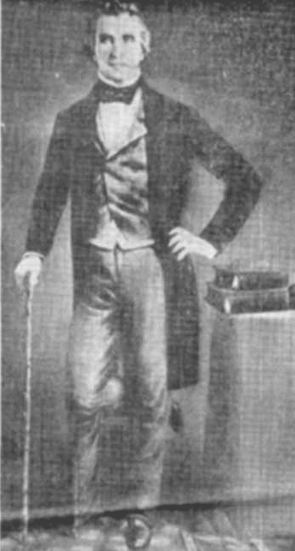 |
'Three-Legged Willie' Brought Law and Order to Shelby County
 |
It was in 1837 that justice came to this area of East
Texas, brought by a "three - legged man" with a long-barreled pistol.
Citizens of Shelby County have all but forgotten his name.
Behind his back, his enemies called "Three-Legged Willie,"
but to his face, it was Judge Robert McAlpin Williamson. And he struck a picture
that was as odd as the brand of justice he dished out.
Judge Williamson had been crippled since he was 15 when a
paralyzing disease left his right leg permanently bent at the knee. In
order to walk, he had to wear a wooden leg from the knee down which he covered
with pants that had three legs.
When he became a judge at 33, he already had earned at least
a small spot in Texas history by being one of the state's early patriots.
Despite his affliction, he was an expert horseman and marksman and had fought at
the Battle of San Jacinto. But it was his term of court in Shelby County
that first insured him a prominent place in posterity and gave Texas a new tale.
Shelby County, was a haven for outlaws in 1837 when it was
established a county. There was no law in this area of piney wood, and it
citizens liked it that way. After Williamson became a judge in 1836,
President Sam Houston gave him the task of establishing law and order in East
Texas.
A few days before Judge Williamson arrived, a group of the
residents met and resolved that court would not be held. When the day of
court finally came and the judge had seated himself behind a dry-goods box that
was to serve ad the bench, a tall, raw-boned man rose from the crowd to address
the judge with words as cold as his stare.
The man declared that the people had decided that the court would not be held
and, reaching to his side, pulled a Bowie knife and laid it before the judge.
"This, sir, is the law of Shelby County." he said. Judge Williamson pulled
a long-barreled pistol from beneath his coat and slammed it down across the
knife "If that is the law of Shelby County," he said, "this is the
constitution which overrides all law. The man withdrew and the court
continued.
Judge Williamson served as judge for four years and help make
East Texas a place safe for new settlers. The outlaws he didn't hang or
put in jail, he ran out of Texas after giving them notice that they would be
shot on sight if they returned.
He was a fair man and once saved the life of an Indian who
had been falsely accused and was about to be lynched. He could also show
compassion for the guilty. Once he was about to sentence a convicted
murderer when the man fainted. He instructed the sheriff to had the "poor
fellow" before he came to.
From the judgeship, Judge Williamson went first to the House
and then the Senate of Texas Congress where he loudly proclaimed the republic's
need for annexation by the United States. So strong was his feelings that
he named his son Annexus. But annexation, when it came, marked the beginning of
the decline of his career.
After failing to get the post as Supreme Court Chief Justice,
he ran unsuccessful campaign for Lieutenant governor and the united States
Congress and then withdrew from political as disappointed man. Following
the death of his wife, Judge Williamson entered a period of depression which let
to metal illness and finally his death at age 55 in December, 1859. No
record of Robert McAlpin Williamson burial is found in Shelby County, it is
believed he is buried in Austin.
Edited from the Houston Chronicle 1967